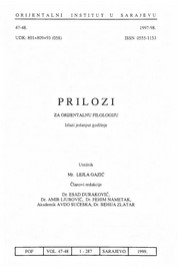CODEX CUMANICUS'UN TÜRKÎCE KISMI ETRAFINDA BAZI PROBLEMLER
SOME ISSUES ON THE TURKIC PART OF CODEX CUMANICUS
Author(s): Mefküre MollovaSubject(s): Cultural history, Theoretical Linguistics, Comparative Linguistics, 13th to 14th Centuries, Philology, Translation Studies, Turkic languages
Published by: Orijentalni Institut u Sarajevu
Keywords: Codex Cumanicus; Turkic language; Linguistic analysis; Persian part of the Codex Cumanicus; Turkic part of Codex Cumanicus;
Summary/Abstract: On the basis of the linguistic analysis of the Turkic language of the Codex Cumanicus, this work points out the imperfections of the tacitly supported concept that the authors of the Codex Cumanicus were of European origin (Italian and Germanic missionaries, who were leaming Turkic, i.e. Kumyk). It also initiates new problems regarding the origin of the composers, transcribers, correctors, and the commentator of the Turkic part of Codex Cumanicus, as well as the Solutions to the posed problems. When the language of Codex Cumanicus was defined, its scientific analysis was jeopardized by the statement that it is the matter to Kipcac language, to the same extent, as well as the statement that it is “Turkish spoken by foreigners” (ecnebi Türkçesi). As the moment, the most acceptable would be the view that the author of Codex is of Kumyc origin. And the fact that the composers of Codex Cumanicus were Turkic, is supported by the preciseness of religious “Turkic-Chaman” wording, in the form that could not have been known to the foreigners. The analysis of the abbreviations and corrections in the transcripts of the manuscript has shown that the transcribers and correctors of the Turkic part of Codex Cumanicus were also Turkic; certain words were previously phonologically close to Uighur, while after the corrections were done, we get the impression that the corrector is of Kumyc Kipcac origin. The similar situation is with words that were previously close to hazar, while after the corrections they would be closer to their Chagatai “pronunciation”. Also, on the basis of transliteration of certain words, it is notable that certain graphemes for certain phonemes correspond to the phonemes of modem Uzbeg.
Journal: Prilozi za orijentalnu filologiju
- Issue Year: 1999
- Issue No: 47-48
- Page Range: 29-52
- Page Count: 24
- Language: Turkish

